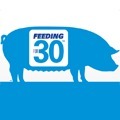 Sows require significantly different nutrients in gestation and lactation. Depending upon stage, consumption per sow varies from 4 pounds per day to more than 20 pounds per day. That said - when should additional nutrients be fed and through which feed ingredients?
Sows require significantly different nutrients in gestation and lactation. Depending upon stage, consumption per sow varies from 4 pounds per day to more than 20 pounds per day. That said - when should additional nutrients be fed and through which feed ingredients?
Brenda de Rodas, Ph.D., director of swine research at the Purina Animal Nutrition Center, says ration formulation in sows should be based on the sow’s current body condition score and her stage of production – often divided into gestation and lactation rations.

Gestation is typically the stage when sows regain condition and prepare for farrowing. In lactation, sows require more nutrients to provide for their litters without losing body condition. In both cases, producers are encouraged to feed their sows to maintain a consistent body condition score (BCS) of 3 on a 5-point scale at all times.
Gestation
The nutrient requirements for sows in gestation are lower during the 114 to 116 day gestation period than during lactation.[1]
“When we create gestation rations, we take in consideration the nutrient requirements of the gestating sow which can be divided into three main components: maintenance, fetal growth and maternal weight gain,” de Rodas says.
Adequately conditioned sows can be fed roughly 4 to 6 pounds of feed per sow per day during gestation, while under-conditioned sows, first parity sows and gilts require additional nutrients through the entire gestation period for maternal weight gain.
Sows currently at a BCS of 3 can be fed for maintenance during gestation to avoid over-conditioning. One way to limit sow consumption during gestation is to feed a ration that is high in fiber content.
“We use soy hulls as a fiber source during gestation at the Purina Animal Nutrition Center,” de Rodas says, explaining that additional fiber options include: beet pulp, rice bran, distiller’s grains, wheat bran, wheat middlings and alfalfa. “The fiber helps the sow to feel full and maintain condition.”
The percentage of fiber fed during gestation depends on the individual goals of the facility and the fiber source.
Fiber levels may be decreased and energy sources increased during the final four weeks of gestation to account for fetal growth. For example, researchers at North Carolina State University say: to meet the energy requirement of a sow at mating, 3.9 pounds of feed are needed, whereas 5.3 pounds of feed are required for a sow at the end of gestation.[2]
Lactation
Sows require significantly more nutrients in lactation than in gestation to care for their litters without sacrificing body condition.[3]
“Lactation is the most demanding phase of the production cycle,” de Rodas says. “The lactation diet should have greater amino acid and greater energy content than a gestation diet because significant protein and energy is needed for milk production.”
“The sow needs all the nutrients she can get during lactation,” de Rodas explains. “The more the sow eats the better potential she has for greater milk production, heavier litters at weaning and shorter time to return to estrus.”
De Rodas indicates that the demand for energy and protein increases immediately following farrowing. Feeding sows ad libitum immediately allows them to consume the nutrients they require before they begin losing condition.
Sows at the Purina Animal Nutrition Center are fed an ad libitum ration through the entire lactation period, with fresh feed supplied each day. On average, each sow consumes between 14 and 15 pounds of feed per day during the period.

De Rodas says that the more nutrient-dense ration helps supply the protein, energy, amino acid, vitamin and mineral levels the sows require.[4]
“Allowing the sows to eat what they need during lactation helps them to fulfill their needs on their own,” de Rodas explains. “This helps to minimize body weight loss during lactation, which, in turn, helps maximize piglet growth rates and optimize reproductive performance.”
[1] van Heugten, Eric. “Feeding recommendations for gestating sows.” North Carolina State University. http://www.ncsu.edu/project/swine_extension/publications/factsheets/810s.htm. 13 February 2014.
[2] van Heugten, Eric. “Feeding recommendations for gestating sows.” North Carolina State University. http://www.ncsu.edu/project/swine_extension/publications/factsheets/810s.htm. 13 February 2014.
[3] Whitney, Mark. “Feed intake during lactation is important to improve sow longevity.” University of Minnesota Extension. http://www.extension.umn.edu/Agriculture/swine/components/pubs/FeedIntakeDuringLactation.pdf. 13 February 2014.
[4] “Feed transition between gestation and lactation is exhibited earlier in sows fed a high-fiber diet during gestation.” J Anim Sci. 2010 Aug. 2010 Apr 23. http://www.ncbi.nlm.nih.gov/pubmed/20418452. 13 February 2014.
November 12, 2014 - Feeding for 30


